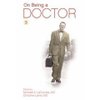
This book is the third volume of a series exploring the role of literature in medicine. More specifically, all of the stories, essays, and poems contained in the book first appeared in Annals of Internal Medicine between 1999 and 2006.*
The book is thematically organized into sections "On Society and the World Around Us," "On Becoming a Doctor," "On Being a Patient," "Balancing the Personal and Professional," "Those Who Are Our Patients," "On Aging," "On Death and Dying," and "Hospitals, Health Systems, Contentions." I particularly enjoyed the section on being a patient, as I am drawn to health care provider's illness narratives for a variety of reasons. Literature and medicine scholars often write about the importance of the moral imagination, and what interests me about the stories told by providers who become patients is that imagination, it would seem, is superfluous.
Though there are many reasons for bringing literature into medical practice, there are both ethical and aesthetic imperatives for doing so. From the ethical perspective, reading literature about medicine can provide important space for physicians and providers to reflect upon difficult moral issues (faced by characters), to weigh questions of character and virtue, and, in so doing, to sharpen the lived flow of experiences as a provider. The phrase "lived flow of experiences" may seem like fluff, but it is actually a term used by some medical anthropologists intended to refer to the daily moments of a person's conscious life, as opposed to the abstractions that typically dominate academic discourse.
Physicians that read and reflect upon other physicians' experiences, as expressed through memoir, essay, short story, or poem, have the opportunity to examine the ethical stuff of daily practice. The ethical content of the literature collated in On Being A Doctor 3 is both obvious and rich. Ethics, as Iris Murdoch notes, is a factor in all of our lived lifes, in the moments of our practices. It is hardly confined to the quandaries or disasters that characterize medical ethics for so many.
Thinking about ethics in the life of medical practice purely in terms of those quandaries is, I submit, a deeply impoverished way of conceiving about the ethical (medical) life. As others have noted, reading and reflecting about literature and medicine may also enhance one's moral imagination. This is because quality works of literature tend to require the reader's response to the particular experiences the character faces: 'What should X do? Why? What would I do?' Sharpening one's own moral imagination would seem to be a boon to clinical practice in and of itself.
Moreover, Rita Charon has pioneered the term "narrative medicine" to refer to the ways in which reading and analyzing narratives may itself enhance therapy and practice:
Through rigorous and disciplined training in such narrative skills as close reading of literary texts and clinical texts, narrative writing about patients, and reflection on one's own clinical experiences, doctors can learn to attend accurately to what their patients tell them (in words, silences, gestures, and physical findings), can reconcile the multiple contradictory versions of any given clinical story, can interpret their own emotional responses to patients, can imagine robustly each patient's plight, can adopt the patient's or family's perspective on the events of illness and–as a result of all these–can offer singularly fitting care.
Though narrative studies are not my area of specialization within the medical humanities (my focus is on ethics and on the history of medicine), I believe such work to be integral to the overall medical humanities' project of rendering medical practice more in-touch with its participants' daily practices, with the lived flow of their experiences. On Being A Doctor 3 is an excellent source of material for work in narrative and pathographies in general.
_____________________________________________
*Full Disclosure: Anne Hudson Jones, the Program Director of my graduate program, is currently an Associate Editor of Annals. As far as I know, she has no idea that I have been asked to review this book, and I have not received any payment, gift, or token in exchange for this write-up.


Comments